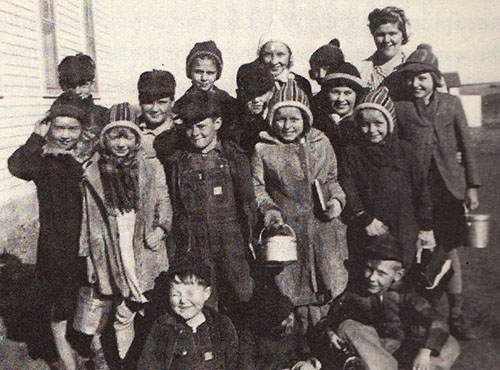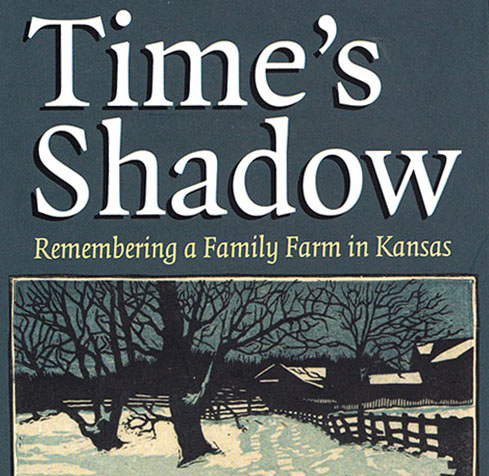Within Memory
Time's Shadow (University Press of Kansas, 2012) by Arnold J. Bauer is about Bauer's family and life on family farms in Kansas in the 1930s, 40s, and 50s. These are exactly the decades my father, John Clouse, was raised on a farm in tiny Murdock, Kansas. Like Bauer, my father's surname is Germanic, and the remnants of German culture in the Clouses dominated other traditions and bloodlines that married into the family. The Bauers were Protestant and the Clouses Catholic, but both families were preoccupied with the rough work of farming during decades of economic collapse, catastrophic weather, war, and cultural change.
Many of the author's descriptions of life in Kansas echo the experiences of my father's family and my memories of their character. I remember, when visiting Kansas, how awkward family gatherings could be. There were several reasons for this, such as my own shyness, squabbles over inheritance, and the limited social contacts in isolated farming communities. Sometimes, during quiet car rides between farms, I wondered if my uncles had simply fallen out of the practice of talking. My relatives didn't seem to have much fun, and their lives didn't appear to be related to the descriptions and photos of life during my great-grandfather's time. His large house had a ballroom, suggesting that his family actually enjoyed dancing, music, and each other. There are photos of my grandfather in a community band and in groups of young people cavorting on lawns. What happened to the following generations? They have moved around (like my family), married badly or well, struggled to stay in the middle class, wherever that is; for the most part, they became strangers to each other. It's hard not to see this as a decline, a move away from something nurturing and warm, though I try to avoid rose-colored retrospection.
 |
| All the Clouse children were baptized on one day in the 1930s. My father is one of the small children at front. |
In his chapter "Church," Bauer writes that his great-grandfather's family came to America as "life-loving Lutherans" and that they made wine and went to barn dances. I'm reminded of a novel I admire and that Bauer mentions, My Antonia by Willa Cather, or even better, her short story "Neighbor Rosicky," and the warmth and spirit of her pioneer characters. However, the Bauer progeny soon lost "not only their old-world piety but also their exuberance for ordinary pleasures." They became less or much more religious, stopped playing cards, and the "corners of mouths turned firmly down." During their youths, Bauer and my father experienced vestiges of immigrant community spirit: family visits, Sunday dinners, dances, and the strong bonds between families and neighbors that grew out of being nearly self-sufficient in rural America around World War II. However, the children of my father's generation have spun far from the old connections, even if they continued to live near their parents and grandparents. It's as if the adventure in a new land faded and communities and traditions didn't evolve quickly enough to help the young adapt to modern life.
It is futile to look for a character flaw in the Clouse family to blame for the faults of its evolution, because the story of apparent dissipation is common. It also takes place on my mother's side, and Bauer describes it well in his book. Perhaps this shift from satisfaction with life to restlessness and separation wasn't a decline, but a kind of immigrant maturation, or, from a more distant perspective, one small cycle in the tides of fortune. After all, many of the immigrants who came to the Midwest must have made traumatic breaks with old, close families in Europe.
Military service and the Korean War drew both Bauer and my father away from Kansas and out into the world. Bauer went to Morocco and my father to Japan and Korea. They never returned to live in Kansas and only visited occasionally, stopping there on the way to other places, for summer vacations, or for funerals. Relatives rarely traveled to visit my family, but then we lived in some remote places. In a chapter about his mother, Bauer tells of one homecoming during which he was in the family house in his city clothes, watching his old, bent mother walk up a hill towards the house carrying two large pails of milk. The scene seems straightforward enough, but his hesitation to help her, her happy tears on seeing him, and his retrospective remorse transform it into an incredibly poignant symbol of the differences that grew between them. My father didn't return home to tears of happiness because his mother resented his departure so much that she eventually wrote him out of her will. She left him one dollar, as she was required to by Kansas law.
Bauer combines an unsentimental tone with tender details and a sense of humor. His chapter "Misbehavior" is a treat, revealing that all wasn't chaste in rural Kansas, but that scandal was so rare that the incidents remained vivid in local memory for decades. He accepts that there was tragedy, but describes joy and simple, quiet lives as well. His background in economics and material culture studies is apparent, and his analyses of the business and technical changes in farming provide welcome perspective. He describes cisterns and tractors with verve, stressing that simple mechanical improvements in farm machinery made enormous differences in the quality of life. Bauer mentions his independent-minded sisters but we never learn much about them, as if Bauer has inherited some of the emotional reserve of his clan. However, the combination of experience, perspective, and talent Bauer brings to his story is a gift.
 |
| The author's class at his one-room school. Bauer is standing third from the right in the middle row. |
 |
| My father, John Clouse, also attended a small school in rural Kansas. He is kneeling, far left. |
Perhaps what I like best about this book is Bauer's understanding of how a place can become part of one's self, how topography and weather affect sense and emotion. At the end of an early chapter on his childhood of trapping, planting, and playing on the farm, he writes that if you come to know every foot of a piece of land, "you develop an intense sense of place never to be lost, the details engraved in your brain and in the memories that later invade your dreams." I see the truth of this in the extended dreamtime of my father's old age. His mind returns to his youth — skipping over years in Africa, Antigua, Micronesia, North Carolina — and he is again moving calves from one pasture another, taking cows to sale, and farming with his brothers in Kansas.
Time's Shadow was chosen by The Atlantic Magazine as one of the five best books of 2012.
